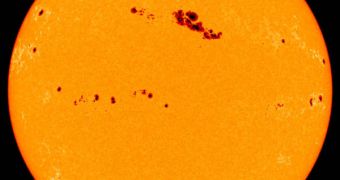Global warming is a terrible consequence of the human race continuously neglecting the planet and sucking it dry of natural resources to produce dangerous greenhouse gases. While some scientists tried to explain at least part of it as being caused by the Sun, this explanation contradicts experimental observations.
While it's true that the Sun exerts an influence on the global conditions of any planets, studies of the Sun's activity since the 1980s show that it has actually decreased, which rules out the possibility of a major contribution the warming effect that currently manifests itself on Earth.
Some scientists claim that Neptune got brighter over the last 50 years, which could mean the Sun may actually play a part in the global warming of a planet, including Earth's, but direct satellite measurements of solar activity in the past two decades seriously contradict this hypothesis.
Since the decline in solar activity has been constant, it cannot account for recent rises in global temperatures, a find that will hopefully silence the ones claiming that we had nothing to do with global warming and that more than a century of polluting the air, the water and the soil just don't count.
"If you change the output of the Sun you will undoubtedly change the climate it's just a matter of how much," admits Mike Lockwood, of the Rutherford Appleton Laboratory, part of the Science and Technology Facilities Council in the UK.
But he continues saying that they "decided to do a simple and direct analysis of the potential role of the Sun in recent climate change without using any model output" and noticed that the Sun should actually have cooled the planet by a few degrees.
"The upshot is that somewhere between 1985 and 1987 all the solar factors that could have affected climate have been going in the wrong direction. If they were really a big factor we would have cooling by now," Lockwood explains in a New Scientist interview.
Even the sunspots have been dropping since 1985, when a peak of their activity was recorded, so the theory linking them to the global warming is flawed as well.
Another find contradicts yet another proposed theory, saying that cosmic rays can help generate clouds that keep the planet cool, since Lockwood and colleague Claus Fr?hlich, at the World Radiation Center in Switzerland, found that cosmic rays reached a minimum around 1985 and have risen since.
If we needed more reasons to stop doubting our contribution to the destabilization of this planet, this study provides more than enough, so maybe we should all just start doing something about it instead of complaining about the Sun and space radiation.

 14 DAY TRIAL //
14 DAY TRIAL //